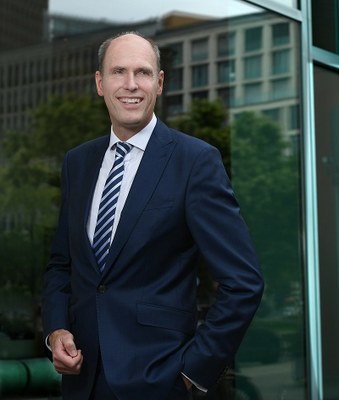“The secret to the University's success lies in the diversity and interconnectedness of its subjects”
Freiburg, Oct 11, 2023
Prof. Dr. Peter-André Alt knows the academic system and universities like no one else. He is a literary scholar, was president of Freie Universität Berlin and, until a few months ago, president of the German Rectors’ Conference (HRK). He is currently establishing the new Wübben Science Foundation in Berlin. Thomas Goebel spoke with him about the present and future of universities.

Prof. Dr. Peter-André Alt, Photo: David Ausserhofer
Dr Alt, as president of the German Rectors’ Conference, you wrote a book entitled Exzellent!? Zur Lage der deutschen Universität (Excellent!? On the State of the German University) What is their current state?
There is no reason for lengthy complaints. Funding could be better, but it is not bad either: In a mixture of permanent funding and competition, universities certainly have some leeway. At the same time, the constant competitive situation in which universities find themselves also poses a problem. They can use third-party funding to obtain additional options for personnel development and research projects, but they cannot plan on it long-term. In addition, one can observe that German universities sometimes lack self-confidence. This includes, literally, that they do not seem to know exactly what they stand for and what their strengths are.
And what exactly makes a university strong?
With over four hundred very different universities in Germany, that can't be said across the board... I think it's a good mix of history, present and future. The universities have gone through many reform processes, not all of which have been positive, but which have strengthened them - they have repeatedly proven themselves to be viable and capable of action, even in crises. Last but not least, universities are the places where the greatest diversity of disciplines come together and ideally work together; this is what distinguishes them from the excellent non-university research institutions that exist in Germany. And the universities are the future because they have the youth, the students, the doctoral candidates. Universities must handle this great resource with care. Students must be encouraged and motivated, and they must be able to plan their careers if they want to go into academia.
You call the university a "difficult institution," but one that is doing better than expected....
I said that from the perspective of the management. The university is a difficult institution because it has many self-confident members who do not always pursue congruent interests. Everyone wants to be involved, but at the same time there is sometimes a tendency to be eccentric and stubborn. These are often important characteristics for excellent research, but they can also be difficult in the sociotope of the university, for example when it comes to dealing with overarching common tasks. Moreover, universities, like all large institutions, are structurally conservative: large tankers are initially reluctant to take on a new course. Whenever a change is imminent, someone always proclaims the downfall of the Western civilisation. As a result, it’s a matter of allying with those who want to take the journey and convincing the others to come along.
What do you think is important for universities to become well- positioned for the future?
Universities should better integrate the topic of the future into their planning and structure. In my opinion, this applies above all to personnel development. It is no longer enough to advertise a professorship and wait to see who applies. We have to search more actively, including internationally, and attract people. That also means considering what attractive working conditions are. And, as already mentioned, we need more planning security for younger people, especially in the post-doc phase. That’s why I would like to see more tenure-track professorships, which then lead to a permanent position when the requirements are met. Overall, we need a new culture of appointments that assumes that universities will also attract researchers with their specific strengths, and not just the other way around.
You cite freedom and diversity as the strengths of a university, which constitute its essence, so to speak. What does that mean, especially for a comprehensive university such as Freiburg?
Freedom and diversity are in a productive interrelationship, but one must also ensure that this can unfold. Freedom is, of course, the prerequisite for scholarly activity. Openness and diversity make the academic milieu richer. Diversity is more than an end in itself; it is an important driving force of any university. And the diversity of subjects, that is to say for a comprehensive university, is its basis – It is the only way a huge spectrum from Egyptology to Zoology can come together. The greatest thing about the university is that it can lead different subjects to a common work program. Humboldt, in a soft-spoken phrase typical of him, calls this “collaboration.” But you have to invest time in order for that to work.
How and where does this “collaboration” succeed?
This existential cooperation must be activated, otherwise there is a danger that nothing will happen, that the subjects will isolate and separate themselves. Cooperation succeeds above all when it comes to the major issues of our present day, such as sustainability and climate change, in medical care, immunology and genetics, in the development of our buildings and cities, in biodiversity or artificial intelligence - wherever we look, we need expertise from a wide variety of disciplines. The secret to the university's performance lies in the diversity and interconnectedness of its subjects.
Ceremonial opening of the 2023/2024 Academic Year with a keynote speech by Prof. Dr. Peter-André Alt: “Academic Freedom and University Organisation: Two Different Worlds?”, panel discussion and presentation of contributions to the essay competition “Freiburg’s University of the Future - Studying, Researching and Working in the Year 2030.
Wednesday, 18 October, 2023, Ceremony followed by award ceremony, from 10 a.m. to 1 p.m., Paulus Hall (ceremony) and St. Paul’ Church kirche (award ceremony).
Full program (in German only)

